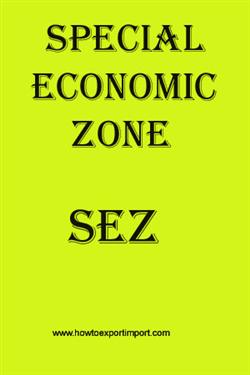 What is a 'Special Economic Zone - SEZ'?
What is a 'Special Economic Zone - SEZ'?
Special Economic Zones (SEZ) are uniquely demarcated areas that are treated as foreign territories with regards to trade and tariff laws.
We can also define SEZ as, a Special Economic Zone is a specified zone deemed to be a foreign territory inside the country which is subject to unique economic regulations that vary from other areas in the same country. They receive wide variety of special exemptions, relating to taxes, quotas, customs and even labor regulations in some cases. SEZ enjoys Indirect tax exemptions include customs duty, central excise duty, central sales tax, service tax, stamp duty and other miscellaneous taxes and duties. Direct tax exemptions include income tax, dividend distribution tax, and securities transaction tax.
Its economic laws are more liberal than a country's typical economic laws. The prime goal was to enhance or flourish foreign investment and provide an internationally competitive and hassle free environment for exports. SEZs play a key role in rapid economic development of a country.
The other objectives of SEZ includes,
- Promotion of goods and services leading to incresed economic activities,
- Investment promotion, development of infrastructure,
- Creation of employment opportunities etc.
In India, the performance of the SEZ units is monitored by a unit approval committee consisting of development commissioner, custom and representative of state government on an annual basis.
Business units that set up establishments in an SEZ would be entitled for a package of incentives and a simplified operating environment. Besides, no license is required for imports, including second hand machineries.
Types of SEZ
- Free Trade Zones (FTZ) /Free Port
- Export Processing Zones (EPZ)
- Free zones/ Free economic zones (FZ/ FEZ)
- Industrial Parks / industrial estates (IE)
- Bonded Logistic Park (BLP)
- Urban Enterprise Zone
Learn Exports Imports Free, Click here
Click here to know GST rate of your goods or service
How to surrender ‘HBL’ House Bill of Lading
How transshipment bill of lading works?
Is letter of credit safe mode of payment?
IGM amendment (Import General Manifest Amendment)
Import clearance under high sea sales
Import customs clearance procedures
Import General Manifest (IGM)
Importance of Bill of Lading
Introduction to this web site.
Is Airway bill a documents of title?
Is Customs House Agents (CHA ) required to be appointed mandatory?
Customs procedures for Palau Export
Registration required to export from Palau
Documents needed for Palau import
Import Customs processes in Palau
Goods and services tax compliance rating, Sec 149 of CGST Act, 2017
Section 146 of CGST Act, 2017 Common Portal
Section 145 of CGST Act, 2017 Admissibility of micro films, facsimile copies of documents
Job work procedure, Section 143 of CGST Act, 2017
Section 139 of CGST Act, 2017 Migration of existing taxpayers
Section 135 Presumption of culpable mental state, CGST Act, 2017
Liability of officers and certain other persons, Section 133 of CGST Act, 2017
GST rate on Instant Coffee
Is NCCD leviable on tobacco products after GST?
Revised GST rate on goods, 21.07.2018
What is Refund of Interest under GST
E way Bill decision taken by 26th GST Council on 10th March
Tax exemption for exporters, 26th GST council
Decisions taken by 26th GST Council meeting held on 10th March
Relevance of Zero rated supply of goods in GST